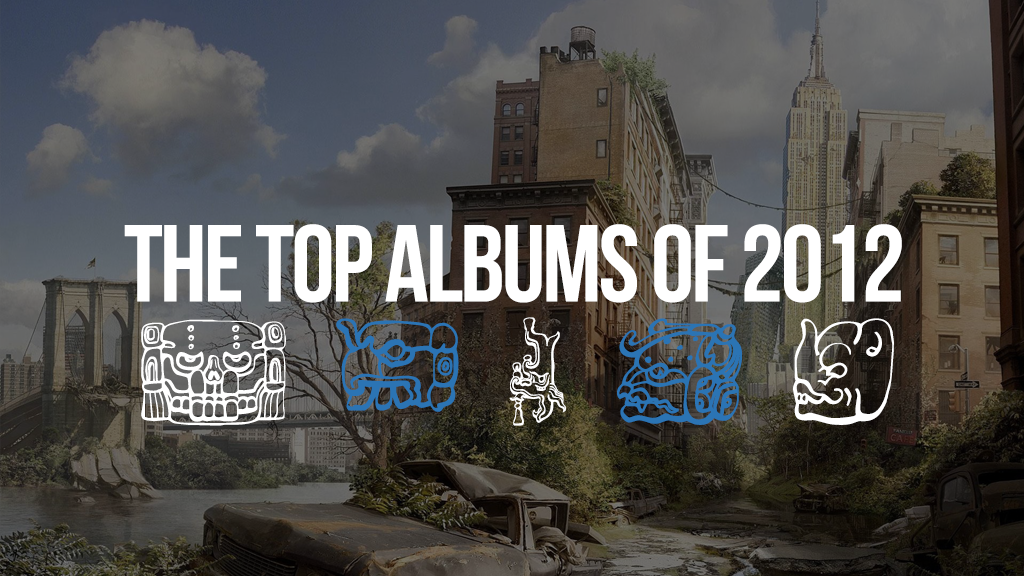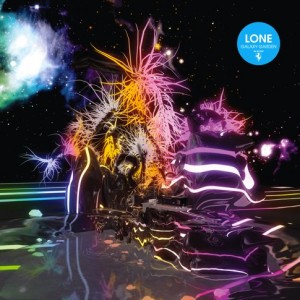
50.
Lone
Galaxy Garden
[R&S]
Who would have guessed that a technicolor, tropically-influenced template would be just the thing to elevate Matt Cutler’s Lone project into the upper echelons of an exceedingly talented pool of young UK producers? Having proven himself over the course of five years with a prolific output and willingness to experiment, Cutler uses the duration of Galaxy Garden to build a stunning piece of work around fast-paced Latin beats, the sounds of nature, and a seemingly endless supply of shimmering synths. The frantic-paced Calypso of “Crystal Caverns 1991” and the understated beauty of “Raindance” rank high among Cutler’s best tracks – the combination of sheer skill and sonic exploration make the album an achievement in its own right, and there is a playfulness to many of the songs here that make them nearly impossible to resist (especially when sitting down and trying to write about them). Galaxy Garden is an invigorating listen, one that sees Cutler at his most confident and pointed in a bold direction that should ensure he has a foothold in UK dance music for years to come.
– Ryan Lester
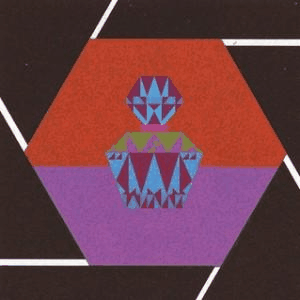
49.
White Fence
Family Perfume Vol. 1 & 2
[Woodsist]
For several years Tim Presley has honed his trade as a somewhat reclusive practitioner of garage folk under the White Fence name, but 2012 found him reaching bigger than ever. Melding Guided By Voices’ collagist approach to songwriting with the lilting Flower Power melodies he’s made his wheelhouse, both volumes of his Family Perfume collection come together to form a sprawling collection of time warped song fragments. Covered in layers of dust and the hissy noise of analog tape, “It Will Never Be” carries a wonderfully lost-in-time feel. The driving Beatles-y melodies could have been rotting away on a tape in someones attic for the last 40 years and come out sounding the same, but such is the nature of Presley’s work. He’s exploited the same niche for the last two albums and here extends it to one of its natural conclusions, a sprawling, messy, collection of catchy bits and pieces of borrowed nostalgia for the misremembered 60s. It’s too much, and it’s not nearly enough.
– Colin Joyce
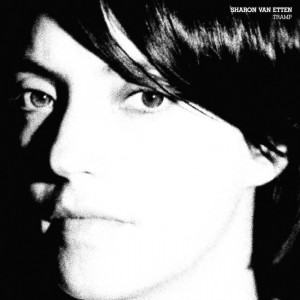
48.
Sharon Van Etten
Tramp
[Jagjaguwar]
I never did get around to learning the names of the songs on Tramp; I’d always just stick it in my CD player and let it play. And while that might make my enjoyment of the album a little misplaced and skewed, I don’t think it has done it any harm: Tramp is a whole album, a journey of recovery, of picking one’s self up and dusting away the cobwebs of life past. It bursts with freeing energy at unexpected moments, but never even flirts with the idea of being over-zealous or annoyingly upbeat, which might just be down to Aaron Dessner’s friendly production, where he stepped up and stepped away at the right moments. Van Etten keeps herself grounded in a realistic world, though, and while she might have friends around her – Zach Condon, Julianna Barwick, and Jenn Wasner to name but a few – she almost endorses the sentiment “you’ve got to lose sometimes” like it’s unquestionable and undeniable. She’s right, but Tramp isn’t one of those times; it’s a winner through and through.
– Ray Finlayson

47.
Voices From the Lake
Voices From the Lake
[Prologue]
Voices From The Lake, the collaboration between Italian techno producers Donato Dozzy and Neel, was initially the title of an online-only mix of ambient techno released under mysterious circumstances by Neel. Who knows how Prologue heavyweight Donato Dozzy got involved, but their immaculately constructed self-titled debut resulted from a legendary set the duo performed at the rustic Labyrinth festival in Japan. It sounds like that too. Voices From The Lake is a single hour and twenty piece that moves with the pace and inhuman patience of tectonic plates shifting over thousands of years. Every single liquid evergreen texture slides in to support a larger whole impossible to really wrap your head around without the benefit of vast, incalculable distances for perspective. It’s breathtaking in its holistic approach, but, listening to the thing, it hardly seems to matter. Voices From The Lake barely musters up a single kick drum or melody. Instead, its powers lie in its ability to immerse and surround. The record builds a complex forest of tactile and cozy texture and sound to wander and drift through, pouring in and lapping gently against the listener’s skin.
– Will Ryan
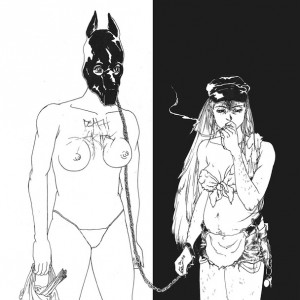
46.
Death Grips
The Money Store
[Epic]
Perhaps no band in the internet age has managed to integrate the all-encompassing, information-overloaded, chaotic nature of the web into their being the way Death Grips did in 2012. The best example of this is their debut record, The Money Store, which consists of pulverizing synths, inventive live drumming, and hyper-aggressive (though often indecipherable) spitting from MC Ride. In a way, it’s almost like hip hop’s answer to Sleigh Bells; a combination of things that don’t sound like they’d work together, but they do by taking cheap, lo-fi instrumentation and kicking it so far into overdrive that the results are totally unique. And this isn’t even to speak of what’s going on beneath the surface. One look at the lyrics to opener “Get Got” reveals a darker undercurrent to what could otherwise be seen as catchy, if intense, party music, and this holds true for most of the record. It’s unsettling in the best way. The Money Store is an album that would have sounded great any year, but seems especially informed in a paranoia-tinged 2012.
– David Wolfson
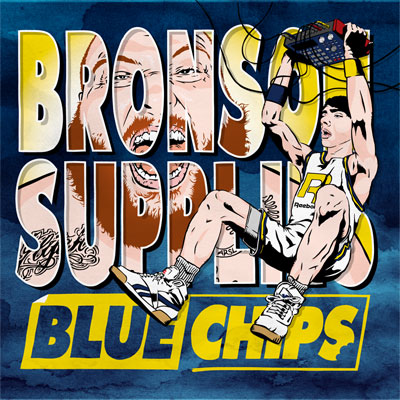
45.
Action Bronson
Blue Chips
[Fool’s Gold / Reebok Classics]
2012 was the year Action Bronson completed his metamorphosis from pudgy Ghostface Killah soundalike to new New York rap luminary, and Blue Chips is his calling card. The product of a series of whirlwind recording sessions with Fool’s Gold Records affiliated producer Party Supplies, Blue Chips is a smoldering slab of neo-classicist boom bap. Party Supplies keeps it simple, looping up classic funk, easy listening, and more, while Action spins detailed yarns about decadent sex, gourmet food, and the perils of street life. Action’s flub in the album’s first verse, the rapturous “WOOH!” after his verse on “Expensive Pens” and the tech fail that cuts the Ozark Mountain Devils sampling “Dreamer” frustratingly short all relay the speed and looseness of the sessions, but the hangpin turns and dense character studies at work in songs like “Hookers at the Point,” a triptych of tales about ladies of the night and their admirers hurtling toward their own undoing, commute the sharp mind of a technician at work. Blue Chips wins for feeling off-the-cuff and deeply considered at the same time. Good music thrives on a little entropy.
– Craig Jenkins

44.
Dan Deacon
America
[Domino]
Things aren’t so hot in the United States of America right now. We just had a Coke/Pepsi election, we’re still in an economic recession, and our individual rights are being stripped as we spend billions of dollars bombing innocent kids in Pakistan. Despite our missteps, there’s a lot of beauty in this country of ours that we can still be proud of and appreciate. Dan Deacon’s America is an ode to precisely that. In an interview with Rolling Stone Deacon admitted, “The music is inspired by the geography of the United States, the beautiful deserts, the mountains, the forests, the coasts. But also the beautiful cities that are rapidly decaying in front of our eyes.”
From track one, Dan Deacon guides the listener across the country starting from the “Guilford Avenue Bridge” in his hometown of Baltimore, to the “Prettyboy” Reservoir, and onwards out west. In the second half, we’re treated to a suite of four linked tracks, traveling from the desert to riding cross-country by train. We’re presented with a geographic view or our country through the eyes of an urban contemporary electronic composer and are reminded the whole way there is beauty still to be found here.
– Evan Kaloudis
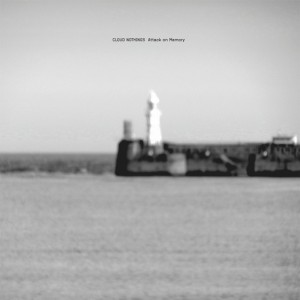
43.
Cloud Nothings
Attack On Memory
[Carpark]
One word that’s bandied around with increasing frequency in today’s musical climate is ‘grower’, pertaining primarily to full-lengths that don’t give it up on the first night, but reward invested time for a payoff far greater than the cheap thrills yer average Vaccines record can afford. As someone who genuinely considered getting a Weezer tattoo a few months back, you’d hardly expect that 34 minutes of relentless drum fills, vicious hooks and instantly memorable melodies delivered at blistering pace would wind up taking a long time to make its mark, but Attack On Memory did just that. Having primarily treated the record as something to throw on when I wanted to expend excess energy in short bursts, once I became accustomed to the nasal strain of the vocals and started to focus on the lyrical content more closely it became a genuinely affecting listen, and took on a greater weight as a result. I began seeing a startling amount of myself in band leader Dylan Baldi, who is only a month younger than I am – the only real difference being that he can grow a gnarly beard and I’m stuck at three day wisps – and found Cloud Nothings continuing an emerging trend of an artist in their early 20s bringing out a compact, scuzzy guitar record that dovetails neatly with my own personal circumstance.
If 2010’s King Of The Beach is the sound of carefree and decidedly adolescent abandon, and last year’s Dye It Blonde neatly encapsulates the giddy naïveté of love, Attack on Memory is there for when shit gets sour. It may be a collection of self-styled bummer jams centred around the kind of existential questions one internalises during a transition to adulthood, but this is hardly the sound of mopey petulance. Baldi better than anyone this year not only examined the bigger picture but decided to tackle it head on, asking all the right questions and leaving it to his audience to fill in their own answers. Cloud Nothings might not be quite the level of the aforementioned Weezer yet, but Attack On Memory suggests they are well on their way.
– Gabriel Szatan
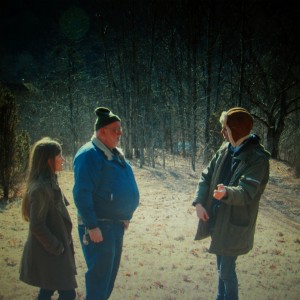
42.
Dirty Projectors
Swing Lo Magellan
[Domino]
Only in Dave Longstreth’s world can making straightforward pop songs be considered a stylistic left turn, and on Swing Lo Magellan, he did just that, proving as versatile a songwriter as he is a composer. In fact, I didn’t want to like this record at first; it wasn’t Bitte Orca 2 like I wanted it to be. But once it started to grow on me, I realized that there was no way it could have or even should have been that. Instead, for Magellan, Longstreth traded in the bombast and ambition that underscored Bitte Orca for the intimacy of The Glad Fact, while still retaining the new attitude of New Attitude. This approach, combined with Longstreth’s strongest, most confident vocal performances to date, resulted in a brilliant record wholly unlike its masterful predecessor. Though meticulous and intricate in its construction as any other Projectors record, it felt looser and more carefree, as on the masterful title track, or “Impregnable Question.” Elsewhere, the defeated “Aw, fuck” in the background of “About to Die” and Amber Coffman’s claim that “That doesn’t make any sense, what you just said” on “Unto Caesar” suggested a more humorous side to Longstreth’s production while retaining the usual composer’s precision. Even the Byzantine rhythm of “Maybe That Was It,” which put me off on first listen, eventually endeared itself to me. “Endearing” is, however, too diminutive a term for this record. “Captivating” is more like it.
– Harrison Suits Baer
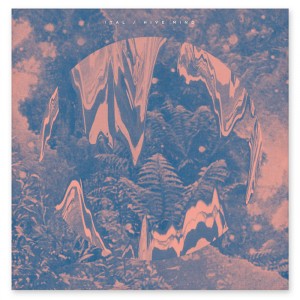
41.
Ital
Hive Mind
[Planet Mu]
Hive Mind opens with a stuttering Lady Gaga sample: “It doesn’t matter if you love him.” Daniel Martin-McCormick has crafted a jagged deep house journey that we do love, despite (or perhaps because of) its gloriously flawed eccentricities. Hive Mind bounces, glides, sputters and jukes, demolishing the very dance music tropes to which it’s so gleefully indebted. Most importantly, Hive Mind is just plain fun, from the Field-like repetition of “First Wave” to the plastic pads and chugging rhythm of “Floridian Void.” It’s all a bit of a mess, but that’s okay, because the best parties usually are as well. One time, I was at some dude’s apartment along with a few dozen other drunken undergrads, and when we ran out of plastic cups, I started drinking from a clown face coffee mug. Ignoring the rudeness of using the host’s wares without asking, I thought it was the funniest thing, this garage sale relic housing neither morning tea nor invigorating coffee but rather whatever putrid/delicious jungle juice we were chugging by the cooler-ful. Hive Mind reminds me of what I remember from that night; dancing on the ottoman, proclaiming that THIS was “totally the best song ever,” and that damn clown cup. The party and the album in question are both the kind of thing you have to be in the mood for, but when the mood strikes, there’s nothing better.
– Josh Becker

